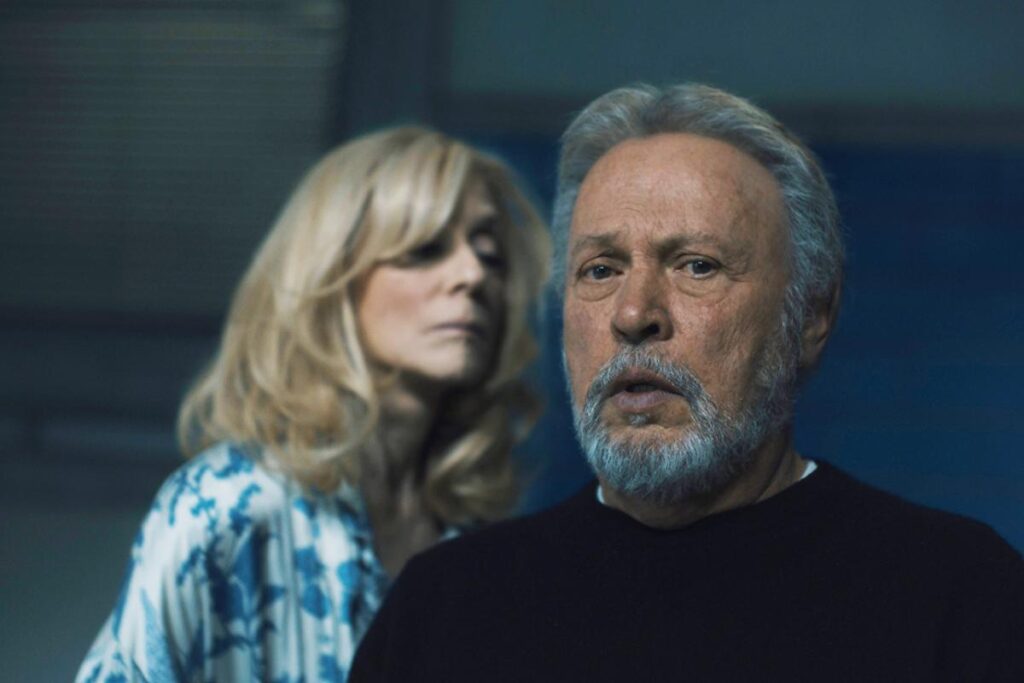Dr. Eli Adler is not a Velvet Underground fan. I don’t know how else to explain his bafflement when Noah, his mysterious patient, puts on VU’s devastating junkie epic “Heroin,” causing the late addict Benjamin Walker’s brother Lawrence to break down and cry. Eli, I’m begging you, at least pick up The Velvet Underground and Nico! (Loaded too, if you want a different kind of sound, but that’s really neither here nor there.)
If I’m making light of this moment it’s not because I wasn’t affected it. Oh, on the contrary. In my review of last week’s episode I made no bones about my admiration for character actor Lenny Venito, who plays Lawrence…or Lonnie, as Noah calls him when he apologizes to him, speaking as his junkie brother Benjamin. Between the boy and the song and his memories of his brother playing it for him over and over — parents, this is a warning sign, but maybe it was also the only way the guy could communicate what he was going through to his baby brother — Lawrence crumbles. Using the incredible power of the song (they don’t even get to the part where Lou Reed sings the word “heeeeeeee-rooo-innnn” like the exhalation of a dying man) and Venito’s excellent performance, the show really makes you feel for the man, and for the brother he lost.
Grief, after all, is Before’s not-so-secret sauce. Take Lynn, Eli’s wife, for example. Though she repeatedly appears to him — and, as of late, to Noah as well — it’s always a coin-toss as to what form she takes. Is she the lovely, stern-faced woman Eli misses? Or is she a bedraggled corpse, dripping with blood and bathwater, reminding him of all his failures? Naturally, given the circumstances of her death, she’s both. Super-naturally? Your guess is as good as mine.
Titled “The Power of Belief,” this episode of Before focuses on Eli’s professed attempt to cure Noah by having him interact with the detritus of Benjamin’s life. Eli’s belief, or so he says, is that Noah somehow believes himself to be Benjamin, though he hasn’t figured out how the boy and the man are connected yet. Apparently there are many such cases of young people with birthmarks that match the wounds on dead people, convincing them they are that person reincarnated. Eli’s theory — again, this is just what he’s saying to convince his colleague Jane to go along with his cockamamie schemes; who knows what he actually believes given everything ricocheting around his brain — is that if he confronts Noah with the remnants of Benjamin’s life, he’ll snap out of it.
This move bears fruit in more ways than deepening the Noah/Benjamin connection, though. Going through Benjamin’s things, Eli finds undeveloped photo negatives labeled “FARMHOUSE” — no doubt the “home” to which Noah says he wants to go. A flash of a girl with a bloody nose sinking through thin ice into the cold water below may be an indication of the terrible thing that happened…wherever that farmhouse is. I guess we’ll see.
If there’s a theme to this episode, I think it can be found in the title. Eli spends part of the episode dealing with his aggressive real-estage agent Sue-Ann, his daughter Barb, and the psychic (Jennifer Esposito, whom I’m always happy to see) they bring in to “psychically cleanse” the house so that it will be easier to sell. Apparently this makes a difference to buyers; you can imagine Eli’s feelings about it. But he would have to lie to himself if he were to deny feeling Lynn’s waterlogged presence during the sage-burning ritual.
Yet at the same time, Eli is utilizing any number of unconventional, even dangerous techniques to “cure” Noah. He hypnotizes the boy, driving him deeper and deeper into his memories, from his happy first meeting with Denise to his troubled time at a previous foster home to, ultimately, the boy’s “memories” of Eli cracking his ribs during his unsuccessful CPR on Benjamin.
Eli refers to this as leaning into Noah’s delusion, in hopes of building some kind of “therapeutic ladder” and helping him climb out, together. What I have to wonder at this point is whether Eli thinks it’s a delusion at all. That’s how he’s playing it out loud, anyway — he insists the reincarnation angle is just in Noah’s head, and he’s still trying to dig up a tangible, verifiable connection between Noah and either Lynn or Benjamin.
But when you’re playing around in a child’s mind the way Eli is — and at times it seems to verge on psychological torture — what are you really doing? Are you trying to heal him, really heal him, really get to the bottom of what ails him? Or are you nudging him toward confirming what you yourself already believe? “Any sufficiently advanced technology is indistinguishable from magic,” wrote Arthur C. Clarke, author of 2001. Which one is Eli applying here? At what point will he realize he’s more after the latter than the former?
Perhaps it’s right now, the end of the episode, where after having a vision of that drowning child he vomits up an unending stream of crystal clear water. I think we’re moving firmly away from the territory of technology now, into a vast and unknown country.
Sean T. Collins (@theseantcollins) writes about TV for Rolling Stone, Vulture, The New York Times, and anyplace that will have him, really. He and his family live on Long Island.
Read the full article here








